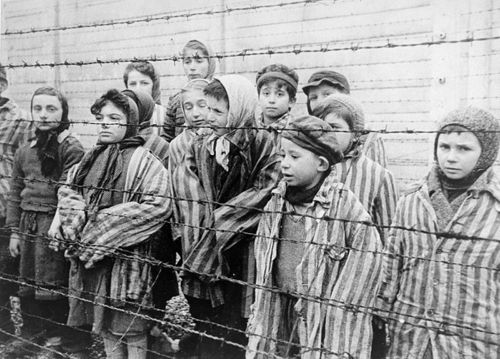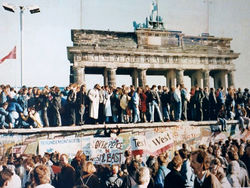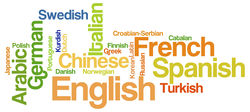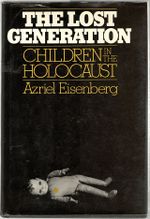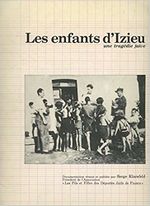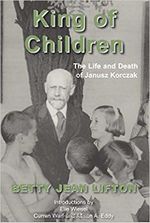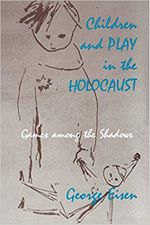Category:Holocaust Children Studies--1980s
|
|
Holocaust Children Studies : 2020s -- 2010s -- 2000s -- 1990s -- 1980s -- 1970s -- 1960s -- 1950s -- 1940s -- 1930s -- Home General : 2020s -- 2010s -- 2000s -- 1990s -- 1980s -- 1970s -- 1960s -- 1950s -- 1940s -- 1930s -- 1920s -- 1910s -- 1900s -- 1850s -- 1800s -- 1700s -- 1600s -- 1500s -- 1450s -- Medieval -- Home
|
1982
Azriel Eisenberg. The Lost Generation: Children in the Holocaust (New York : Pilgrim Press,1982)
"Collects firsthand accounts of the Nazi persecution of Jewish children during World War II and the efforts of the members of the organization, Youth Aliyah, to rescue these children ... Explores the wide range of experiences suffered by children during the Holocaust, including their lives in the Nazi ghettos and concentration camps, as well as years spent hiding in the forests ... Passing as Aryans, or living under the protection of righteous gentiles. chapters 6 and 7 explore children's diaries, including Anne Frank's, and written testimonies by children."--Publisher description.
Azriel Eisenberg (USA, 1903-1985) -- The child of Jewish immigrants, Eisenberg devoted his entire life to the cause of Jewish education. His interests led him to revisit the experience of children during the Holocaust. After the anthologies of the 1940s, his book was the first collection of children's accounts of the Holocaust.
1984
Les enfants de Buchenwald: que sont devenus les 1000 enfants juifs sauvés en 1945? (Lausanne, Suisse : P.-M. Favre, 1984) is a book by Judith Hemmendinger.
The Children of Buchenwald : Child Survivors and Their Post-War Lives, English rev. ed. by Judith Hemmendinger and Robert Krell (Jerusalem ; Hewlett, NY. : Gefen House, 2000).
Also translated into German.
Some of the 426 child survivors of Buchenwald tell their stories, from their lives in the camp, their liberation, and their struggle for normalcy and emotional well-being.
From Auschwitz to Liberation -- Arrival in France -- The children at Ambloy -- Lulek's story -- Romek's story -- Taverny -- Destinations- leaving Taverny -- Life journeys- 20 years later in New York -- Life journeys- France -- Life journeys- Israel -- Elie Wiesel -- Observations and conclusions.
1984
Serge Klarsfeld. Les enfants d'Izieu (Paris [France]: B. Klarsfeld Foundation, 1984) <French>.
English tr. The Children of Izieu (New York, NY: H. Abrams, 1985).
"Presents the story of an orphanage in Izieu, France that sheltered Jewish children from all over Europe who had escaped Nazi persecution. In 1944, one month before World War II ended, the Gestapo sent soldiers to the orphanage to arrest all the children and caretakers. Those arrested were taken to Auschwitz for immediate execution. The events are recounted through the stories of those who escaped the Nazi raid."--Publisher description.
Serge Klarsfeld (b.1935) is a Holocaust child survivor, a Romanian-born French activist and Nazi hunter known for documenting the Holocaust in order to establish the record and to enable the prosecution of war criminals. Born in Bucharest into a family of Romanian Jews, they migrated to France before the Second World War began. Serge's father was deported and killed during the Holocaust. Serge was cared for in a home for Jewish children operated by the OSE (Œuvre de secours aux enfants). His mother and sister also survived the war in hiding in France. In 1979 Serge helped found and has ever since led the Sons and Daughters of Jewish Deportees from France (Association des fils et filles des déportés juifs de France).
1988
Betty Jean Lifton. The King of Children: A Biography of Janusz Korczak (New York, NY: Farrar, Straus and Giroux, 1988).
"A detailed biography of Janusz Korczak (1878-1942) - doctor, teacher, writer and educational theorist - who was deported along with the children of his orphanage in August 1942 from the Warsaw ghetto to Treblinka, where they perished ... This is the tragic story of Janusz Korczak (as featured in the major motion picture The Zookeeper's Wife) who chose to perish in Treblinka rather than abandon the Jewish orphans in his care. Korczak comes alive in this acclaimed biography by Betty Jean Lifton as the first known advocate of children's rights in Poland, and the man known as a savior of hundreds of orphans in the Warsaw ghetto. A pediatrician, educator, and Polish Jew, Janusz Korczak introduced progressive orphanages, serving both Jewish and Catholic children, in Warsaw. Determined to shield children from the injustices of the adult world, he built orphanages into 'just communities' complete with parliaments and courts. Korczak also founded the first national children's newspaper, testified on behalf of children in juvenile courts, and, through his writings, provided teachers and parents with a moral education. Known throughout Europe as a Pied Piper of destitute children prior to the onslaught of World War II, he assumed legendary status when on August 6, 1942, after refusing offers for his own safety, he defiantly led the orphans under his care in the Warsaw Ghetto to the trains that would take them to Treblinka."--Publisher description.
Betty Jean Lifton (USA, 1926-2010) was an adopted child. For entire career as a psychologist, she kept a clear and present focus on children, on children’s issues, and on children’s literature. She authored several books on adoption.
1988
George Eisen. Children and Play in the Holocaust: Games among the Shadows (Amherst, MA: University of Massachusetts Press, 1988).
"Studies the importance of "playing" to the survival of children in Nazi organized ghettos and concentration camps. illustrates how the feeling of normalcy created through play, provided not only a means of control by adults ... But a psychological Force which allowed for spiritual survival. examines the nature of games played, emphasizing how games such as "blockade" and "gas Chamber" reflected the environment in which they were created and played."--Publisher description.
George Eisen (b.1943) was born in German-occupied Hungary. As a little child he spent a year in hiding with his Jewish mother while his father was held prisoner in a concentration camp. He attended high school in Hungary, college in Israel and received a doctorate from the University of Maryland. He has taught in Cal Poly Pomona’s physical education department since 1979. He got the idea for his book while researching organized Jewish sports in pre-World War II Europe for his doctorate.
Media in category "Holocaust Children Studies--1980s"
The following 47 files are in this category, out of 47 total.
- 1980 Bitton-Jackson.jpg 312 × 499; 36 KB
- 1980 Edelbaum.jpg 352 × 499; 38 KB
- 1980 Oberski de.jpg 314 × 500; 21 KB
- 1980 Pisar.jpg 341 × 499; 24 KB
- 1980 Sagal film.jpg 310 × 413; 21 KB
- 1980 Wiesel it.jpg 294 × 500; 11 KB
- 1981 Orlev (novel).jpg 186 × 270; 10 KB
- 1981 Rubinowicz.jpg 251 × 392; 25 KB
- 1981 Siegal.jpg 339 × 499; 27 KB
- 1981 Zyskind.jpg 355 × 499; 35 KB
- 1982 Eisenberg.jpg 639 × 935; 131 KB
- 1982 Oberski fr.jpg 322 × 479; 20 KB
- 1983 Gyongyossy & Kabav (film).jpg 1,000 × 1,429; 151 KB
- 1983 Oberski en.jpg 400 × 590; 47 KB
- 1983 Weinstein.jpg 307 × 500; 36 KB
- 1984 Bierman.jpg 324 × 499; 41 KB
- 1984 Hemmendinger fr.jpg 345 × 499; 40 KB
- 1984 Klarsfeld.jpg 363 × 499; 32 KB
- 1984 Merti (book).jpg 310 × 400; 28 KB
- 1984 Orlev en (novel).jpg 340 × 499; 30 KB
- 1984 Schwarberg en.jpg 300 × 434; 37 KB
- 1985 Herman.jpg 324 × 499; 41 KB
- 1985 Klarsfeld en.jpg 185 × 260; 15 KB
- 1985 Klimov film.jpg 260 × 398; 40 KB
- 1985 Weinstein.jpg 336 × 499; 27 KB
- 1986 Auerbacher.jpg 327 × 499; 40 KB
- 1986 Bauman.jpg 340 × 499; 31 KB
- 1986 Minsky.jpg 333 × 499; 26 KB
- 1987 Davies film.jpg 550 × 785; 69 KB
- 1987 Gies (book).jpg 400 × 637; 31 KB
- 1987 Malle (film).jpg 271 × 366; 21 KB
- 1987 Oberski es.jpg 325 × 499; 23 KB
- 1987 Sherin (film).jpg 199 × 253; 9 KB
- 1988 Appleman.jpg 329 × 499; 39 KB
- 1988 Bauman.jpg 341 × 499; 27 KB
- 1988 Eisen.jpg 333 × 499; 30 KB
- 1988 Erman film.jpg 232 × 429; 23 KB
- 1988 Freiberg.jpg 333 × 499; 23 KB
- 1988 Hurwitz - Rosenberry.jpg 400 × 599; 35 KB
- 1988 Lifton.jpg 336 × 499; 28 KB
- 1988 Lindwer (doc).jpg 1,000 × 1,397; 71 KB
- 1988 Minsky.jpg 304 × 499; 17 KB
- 1988 Schloss.jpg 400 × 631; 23 KB
- 1988 Seidelman film.jpg 1,000 × 1,506; 108 KB
- 1989 Baylis-White.jpg 293 × 499; 26 KB
- 1989 Nir.jpg 333 × 499; 25 KB
- 1989 Pederiali.jpg 811 × 1,316; 241 KB
